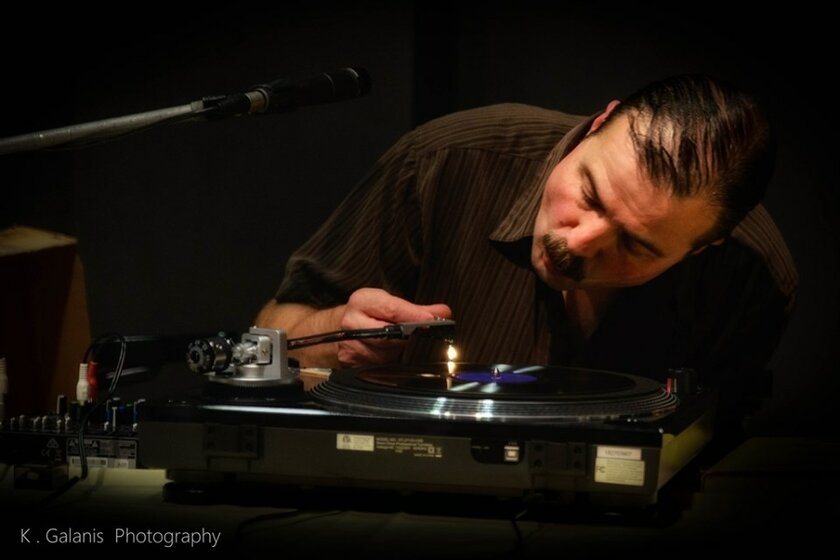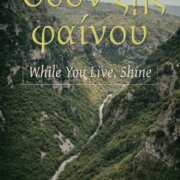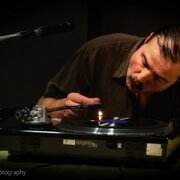Interviewed & Written by Sana Rizvi
"While you live, shine.
Have no grief at all.
Life exists a short while,
And time demands its fee."
- "Seikilos Epitaph", the oldest complete song in the world.
American musicologist Christopher C. King is a legend. He is the most obsessive collector of old 78 rpm records alive and is also the only one who can use modern technology to unlock their sonic secrets, re-mastering them for a 21st-century audience. As one article puts it so succinctly "From ultra-early blues to unknown European mountain music, King searches so the rest of us don't have to...."
For years, he's lived in a world of nostalgia, listening to music from a distant past. But his discovery of the music of Epirus in northern Greece changed his life. Because the old 78s he first fell in love with, containing a barbaric and raw folk music that he believes connects us with our most ancient ancestors, is still being played today in the mountains of Epirus. In King's words, "the music is so unpretentious and stark that I doubt that many would even regard it as music… it is more like a profound tonic or salve for our wilted spiritual wounds." Travelling there, Chris began to break out of his prison of nostalgia and started to find a home for himself, for the first time in his life.
Acclaimed filmmaker Paul Duane's documentary "While You Live, Shine" through its layered poetic storytelling, evokes in an audience a plethora of emotions. It not only introduces some of the most hypnotic and beautiful music you've never heard, but is an immersive trip into an isolated and half-forgotten land, plus offers a portrait of a man who has finally found his spiritual home on the other side of the world. The film gets its title from the Seikilos song, the world's oldest recorded piece of music, from Greece. The transcendental music carved into stone endures in Epirus, at panegyria, the annual summer festival where the Greeks gather to celebrate life and death.
While You Live, Shine opens the WOMEX 2019 Film Programme on Thursday, October 24th at 11am in the Small Auditorium at Tampere Hall. WOMEX Film's Sana Rizvi, had the chance to catch up with the man himself, sonic archaeologist Christopher King, to find out what keeps him kicking and ticking in today's world.
Chris, what do you usually say to those who ask you what you do?
Chris King : Normally, I tell most people that I'm a retired undertaker.
If I like somebody, I explain that I tell stories through music that I try to understand our past through the music we used to make. But it is rare when I like somebody.
Your father owned Les King's Musical museum, collecting music machines. In an interview with NY Times, you mentioned his collection makes you look like a puny ant. Could you tell us a bit more about what you collect and how your father's obsession rubbed off on you?
Chris King: My primary collection is with 78 rpm discs of folk music from around the world. Around 5,500 of them. I don't collect vinyl. I do collect 1930s hotel diner-ware, early 20th-century advertisement artwork, 19th and early 20th century books on eugenics, and vintage sex toys from Peru.
Your belief in music, especially music from way back having medicinal and healing properties, is something most indigenous cultures would agree with you on. Did this thought come when you heard music from Epirus or was it even before that while collecting unvarnished pre-war music from America?
Chris King : I'd say that I heard this in the unvarnished, raw music from America that I collected starting when I was a teenager. But I was aware of this concept existing in aboriginal cultures around the world. So, I'd like to believe that the people of Epirus (and other parts of rural Greece) have a genetic memory or an innate predisposition to be receptive to the healing properties of their native music.
You have mentioned in your writings and talks, that the music from Epirus contains within it a healing functionality not just for the individual but also for an entire community. At the multiday music-intensive events held in Northern Greece called panegyria, there is a sense of communal transcendence. During these divisive times, that sounds like the balm we all need. Can you unpack for us how you felt when you first heard the Zoumbas record in Istanbul in 2009?
Chris King : The first time I heard the records by Kitsos Harisiadis (clarinettist from Epirus) and Alexis Zoumbas (violinist from Epirus), I heard two different things: first, I heard the same uninhibited rhapsody that is contained within the pre-war music in my collection and second, some intentionality or purpose or design in this specific music that was elusive to me. That it was designed or crafted for some effect on the listener. I didn't know what that purpose was, but I did feel calmed by the music of Kitsos, and I felt devastated by the music of Alexis.
How did Paul Duane the director of the film and you meet? Who discovered whom? And was a documentary the next natural thing to document the music, its histories and significance post your book Lament from Epirus?
Chris King : Paul contacted me after he had heard the album of music that I produced of Alexis Zoumbas. Fortunately, I was already more than halfway through drafting the book when he and his team came to Epirus. Yes, I suppose it is a natural thing to want to visually document this music since some minds prefer to see rather than to hear or feel. Obviously, though the best thing is for one to visit the soil there and experience it for themselves.
In this edition of WOMEX film, the theme on preservation of music runs very strong. Do you believe it's a need of the hour and do you feel the use of film/visual can help capture and capsule those traditions and memories that are present within music?
Chris King : I have very mixed feelings about music preservation beyond the act of collecting and disseminating the vintage, antiquated media. Music is preserved organically by those who love their music and value its function within their culture. If we believe that music has nothing to offer, then we get nothing from it. And so, one person or a group of people (outsiders both) cannot "preserve" music beyond the shelf life decided upon by those that create and engage in their own music. To think otherwise is vain and foolish. Of course, you can capture and present both the audio and the visual aspects of a given folk music, but I think it in no way helps preserve the music for the people who created it. It only becomes a memory. Often, a sad memory. If you read, Lament from Epirus, it is clear that in the introduction, the capturing of the most beautiful music in the world results in a profoundly sad memory. I just happen to be enamoured with sad memories.
You once said that new music to you is old 78's that you have not yet heard. What are you discovering and uncovering currently?
Chris King : Carnatic violin music from India, oud solos from Asia Minor, spoken language discs of dialects/languages that have nearly disappeared, Pontic music, Carnival Barker recordings.
How do you feel about the current state of music, how it is heard and being consumed?Is there a thread that strings all the music from around the world that profoundly affects you?
Chris King : It's an abomination, a blight, a cancer, a plague, a pestilence on par with any the horrors detailed in the Apocalypse. But these are the kinder things that I can say about it. The single thread that runs through all the music I love is unpretentiousness. That is to say, it is honesty conjoined with intimacy.
More information on Christopher King's other worldly work can be found on Long Gone Sound Productions .
article posted by:Sana Rizvi, Piranha Arts




